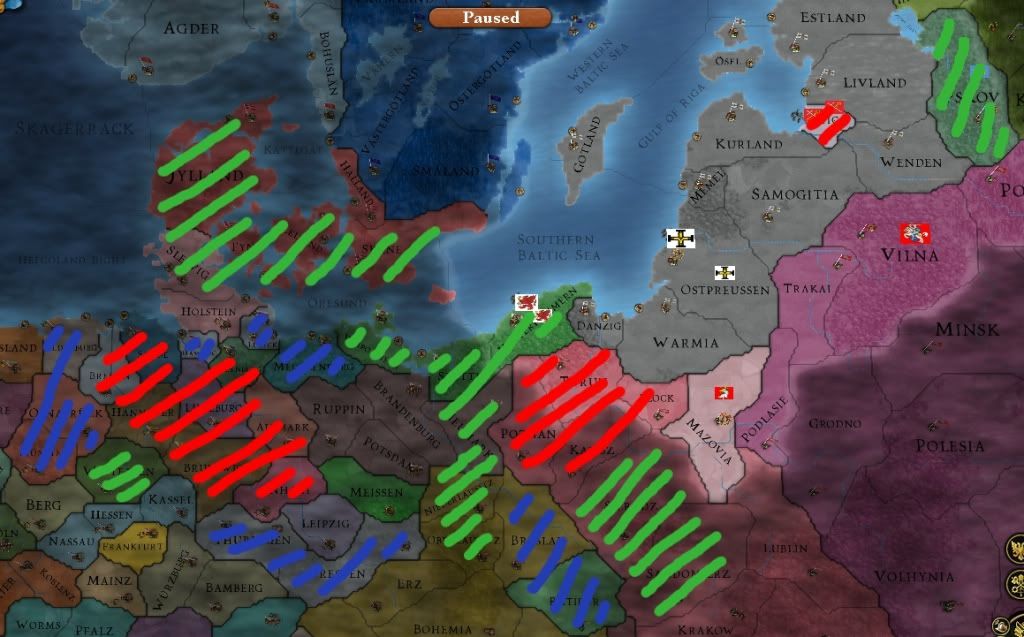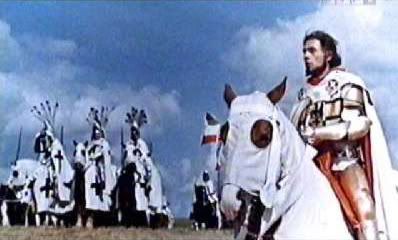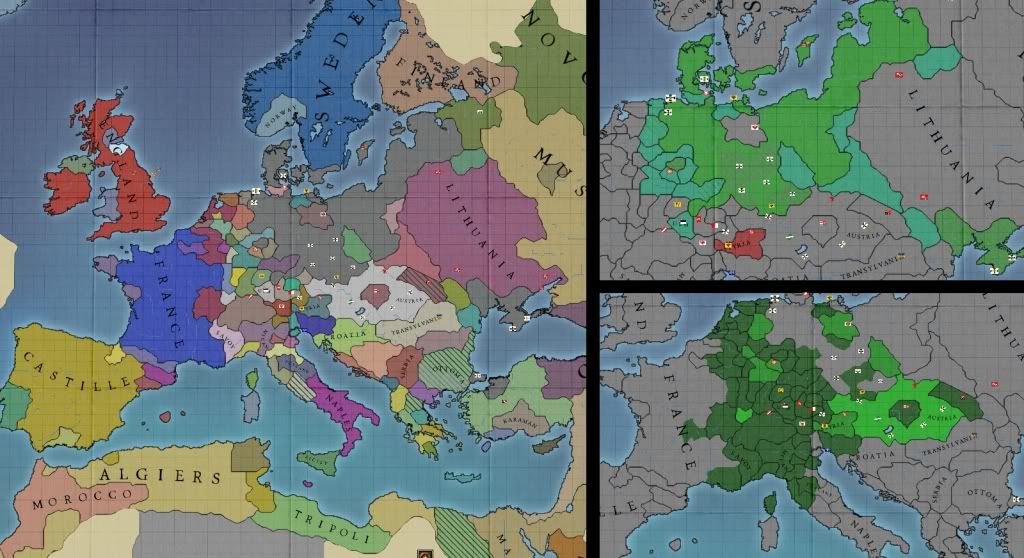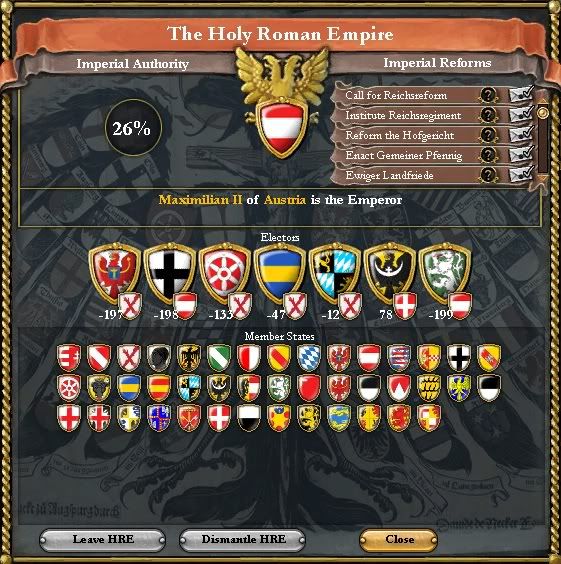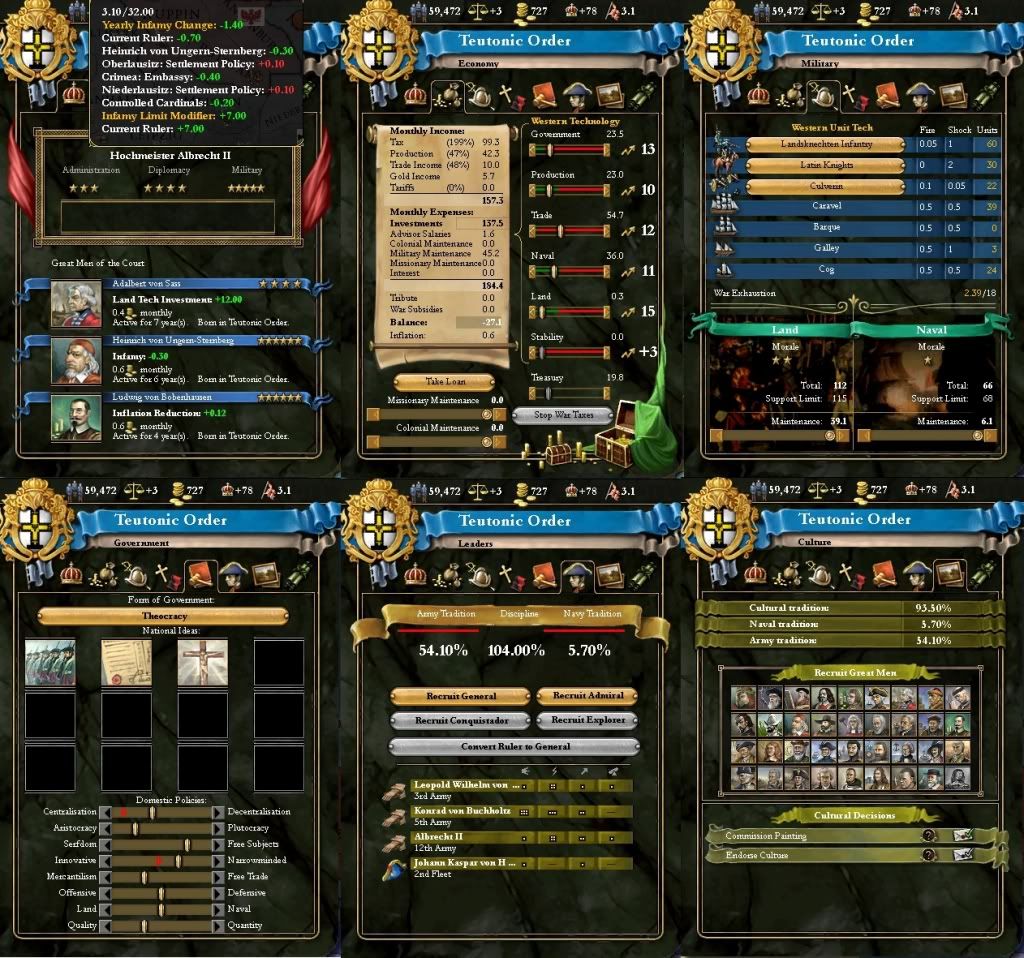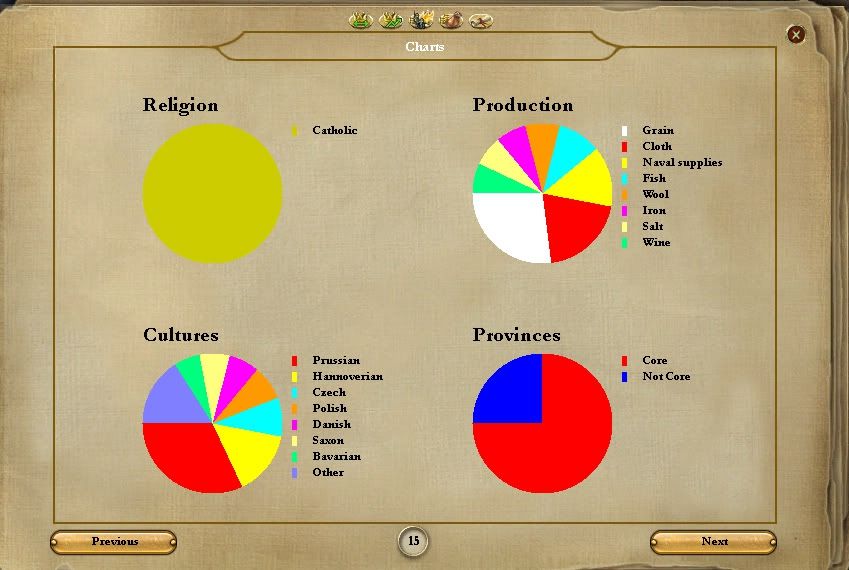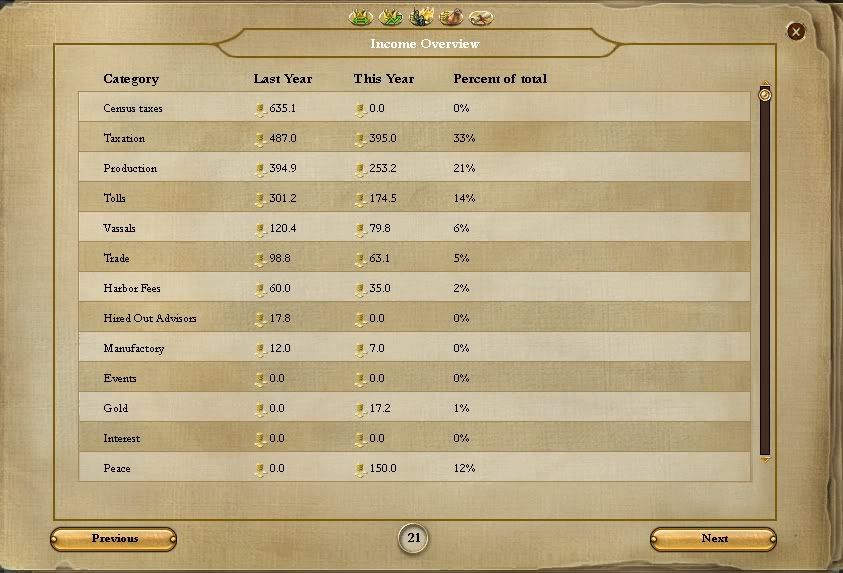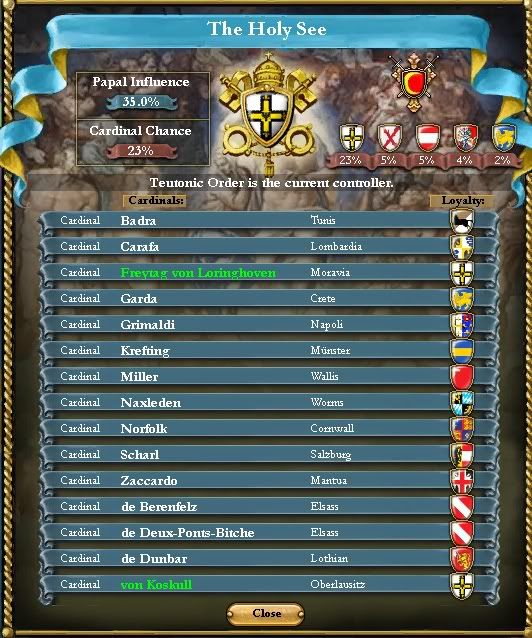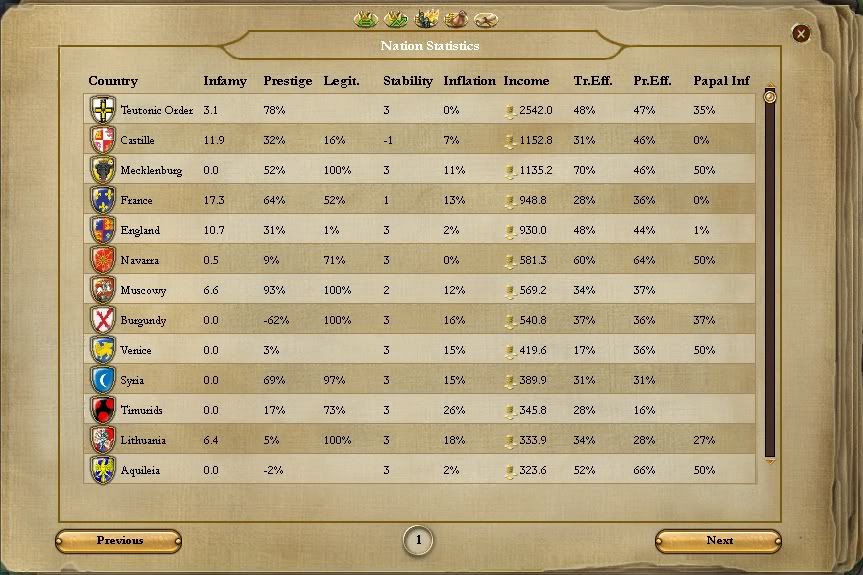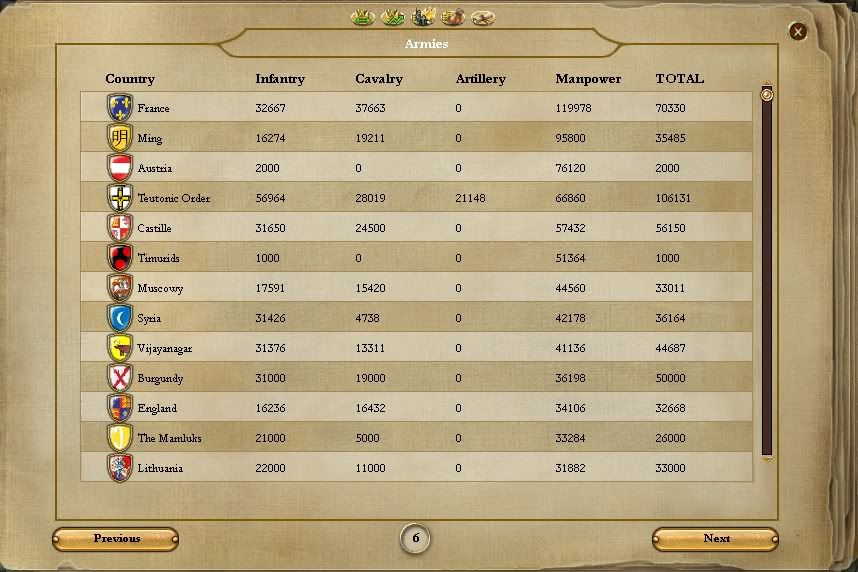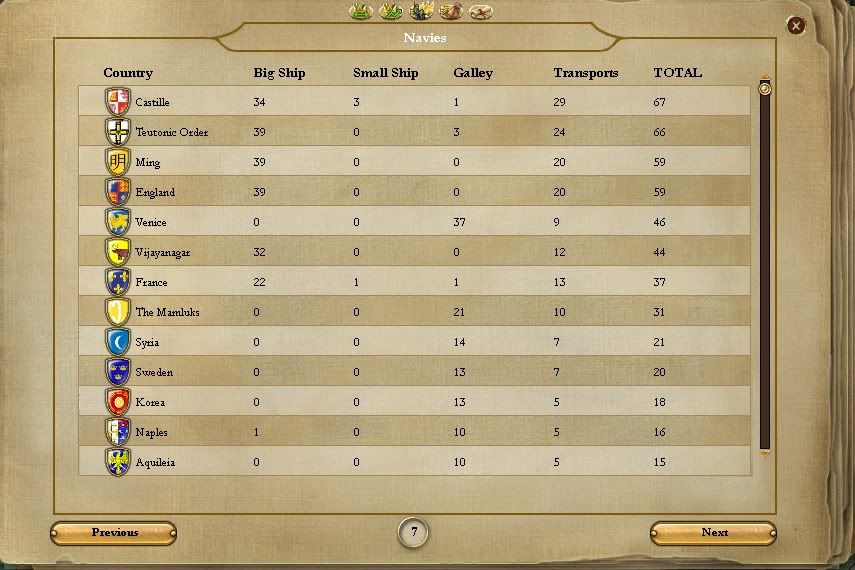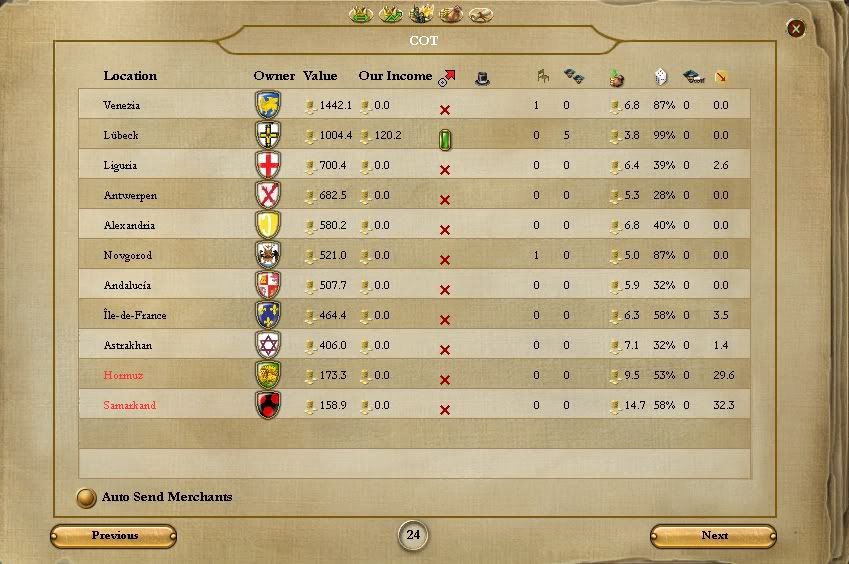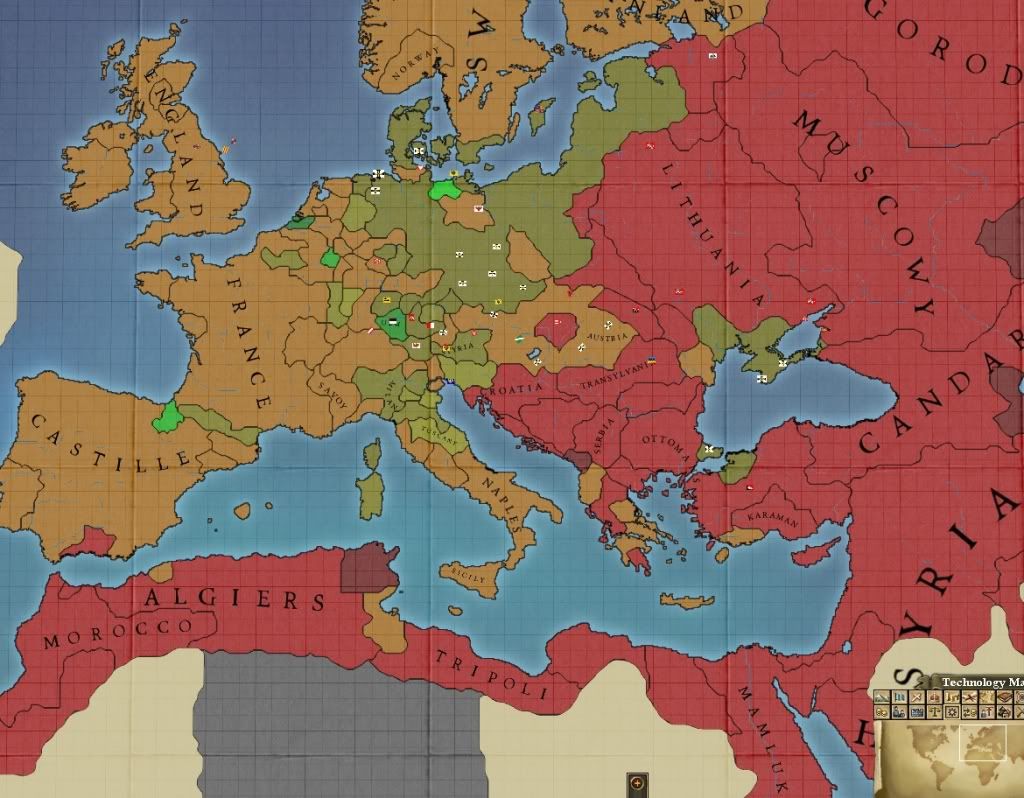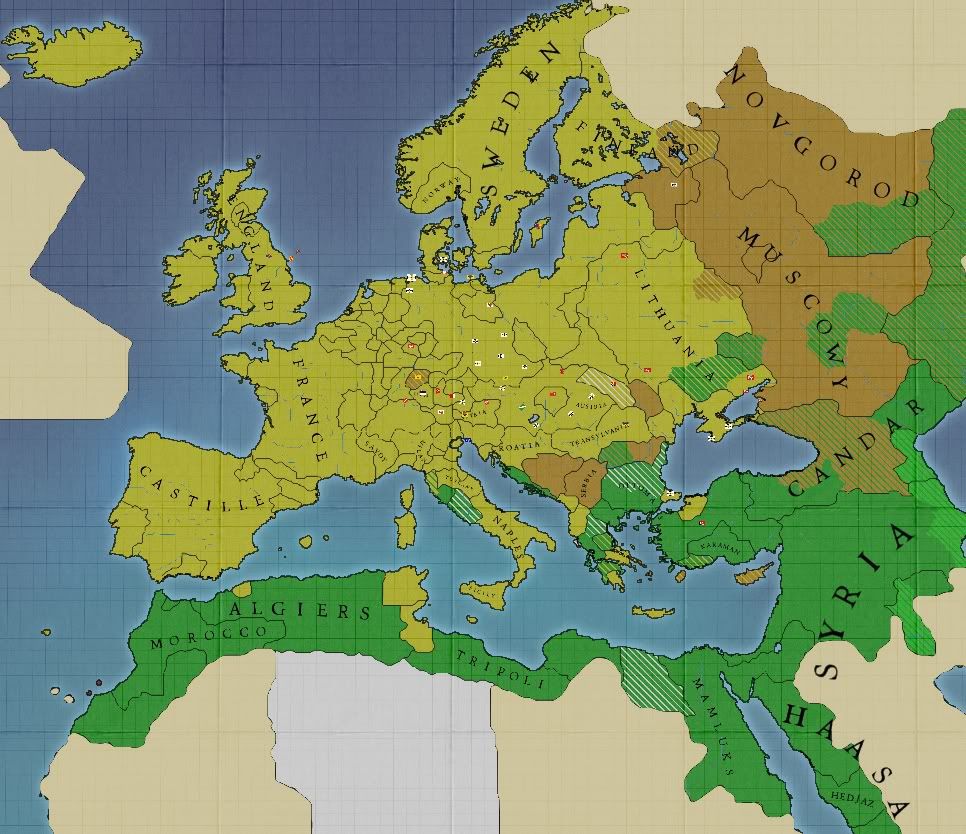The Iron Cross Triumphant
St Karl Joseph the Broken Crescent 1466 – 1493
During Friedrich’s short reign Europe and the Order in particular had adopted a “you go first” attitude towards the Ottomans. None of the Christian nations felt secure enough to take on the sultan alone, causing a total lack of response to the occupation of Rome. Karl Joseph was elected Hochmeister with two goals: consolidate the Teutonic hold on Germany and defeat the Ottomans. In addition to being a competent general and excellent provincial governor, Karl Joseph was an avid student of history, and the crusades in particular. During the generalkapital his warnings against repeating the mistakes of previous crusades and sending armies into the enemy’s lands on a river of their own blood are believed to be what tipped the conference in his favor. Karl Joseph saw two ways of defeating the Ottomans, a pan-European assault in which each nation would contribute a fraction of their forces (as envisioned by Friedrich), or a primarily Teutonic invasion, which would require a naval base in the Mediterranean and stable supply lines between the Ordenstadt and the Ottoman Empire.
To Kill an Emperor
The Order was fairly quiet for the first few years of Karl Joseph’s reign, the only notable event being the peaceful annexation and integration of the Hanseatic League. But, by 1470 Emperor Vaclav had blatantly failed to organize a crusade against the Ottomans as he had promised. Once more, the Imperial diet resolved that the emperor should be removed, and Karl Joseph eagerly declared war. The result was the same as before and within a year Bohemia was annexed and its sole ally Meissen vassalized by the Order. Vaclav V had reigned as Holy Roman Emperor for an incredible fifty-three years, and had seen his empire crumble before the knights. During the final battle for Bohemia he refused to surrender to the Teutonic armies, and fought to the death against the Hochmeister’s personal guard. It was sad end to a great but tragic man.
Karl Joseph in "The Last King of Bohemia" shortly before the final battle with Vaclav V
The French Look East
With the death of Vaclav V, the electors crowned the Archduke of Austria, Rudolf V Hapsburg emperor. Austria was the strongest remaining imperial state, and ideally placed to combat the Ottomans. Unfortunately, matters in Europe made an Austrian crusade practically impossible. The French, having finally consolidated their hold on France proper began expanding into the neighboring states inside the Empire. Burgundy, Alsace, and Lorraine were their primary targets, and the Austrians were forced to defend against the French aggression instead of the Ottomans. Viewing an Imperial crusade as an increasingly remote possibility, Karl Joseph decided to proceed with his alternate plan. No opportunity existed for him to gain access to the Mediterranean, so he decided to further strengthen his hold over Germany.
A border dispute with Bavaria in late 1471 gave Karl a cassis belli against the Bavarians, which he promptly exercised. Only the Poles rallied to the Bavarians side, and the conquest was swift. Oberpfalz was annexed and the Poles were forced to swear fealty to the Ordenstadt.
Several years of peace ensued, during which Karl Joseph worked on developing and consolidating the Ordenstadt. After several generations under Teutonic rule, the Orders claims to their conquests in Northern Germany were finally accepted by all. Furthermore, the final cinders of rebellion in the conquered Danish provinces were finally extinguished. Records indicate that the region was considered loyal enough that a Teutonic army was no longer stationed there in times of peace. Direct control of the massive trade center at Lubeck swelled the Order’s coffers. The extra money was used to upgrade and improve the navy with new warships of the caravel design from Portugal. Although not certain, the Teutonic navy at this time is believed to have consisted of roughly a dozen caravels and perhaps a score of older carracks. A massive building program was undertaken with constables and marketplaces throughout the Ordenstadt boosting order, trade, and consequently tax revenue. Finally, in 1477 the nation of Thüringen was integrated into the Ordenstadt, finally connecting the Eastern and Western halves of the Order.
War broke out once again in 1478. The small nations of Cleves and Hesse had run diplomatically afoul of the Order, which claimed that they should be under their “protection.” With the Austrians still embroiled against the French, Karl Joseph felt that the Emperor would not get involved against the Order. However, Rudolph refused to allow further Teutonic expansion without a fight, and joined with the imperial states against the Order. With the Austrian armies still positioned against France, the Order was quickly victorious. By 1479 Hesse, Cleves, and Holstein (which had unwisely forsaken its alliance with the Order) were vassalized. The Emperor was let off with no punishment as Karl Joseph did not want to impair their ability to halt French expansion.
An opportunity for the Mediterranean finally appeared when Venice declared war against the nation of Smolensk, which was guaranteed by the Order. The Venetians had not counted on the Order joining the fight, and were completely outmatched. Records indicate the most of the fighting was done by the Polish and Moldavian allies of the Order who neighbored Venice’s Black Sea territories. At the peace table in 1482, Karl demanded the province of Cherson, which was directly connected to the Ordenstadt through Poland and Moldavia giving the Order an accessible port in the Black sea. Construction on a massive road and accompanying supply depots to Cherson as well as port facilities was begun, in order to pave the way for the eventual Teutonic Crusades. In addition, a Teutonic army and naval squadron were stationed in Cherson and ordered to quell any rebellion as quickly as possible. Eventually Cherson would be the springboard which the Order would use against the Ottomans. While several aggressive generals urged for immediate war, Karl was determined to ensure stable supply lines to the front before any action was taken.
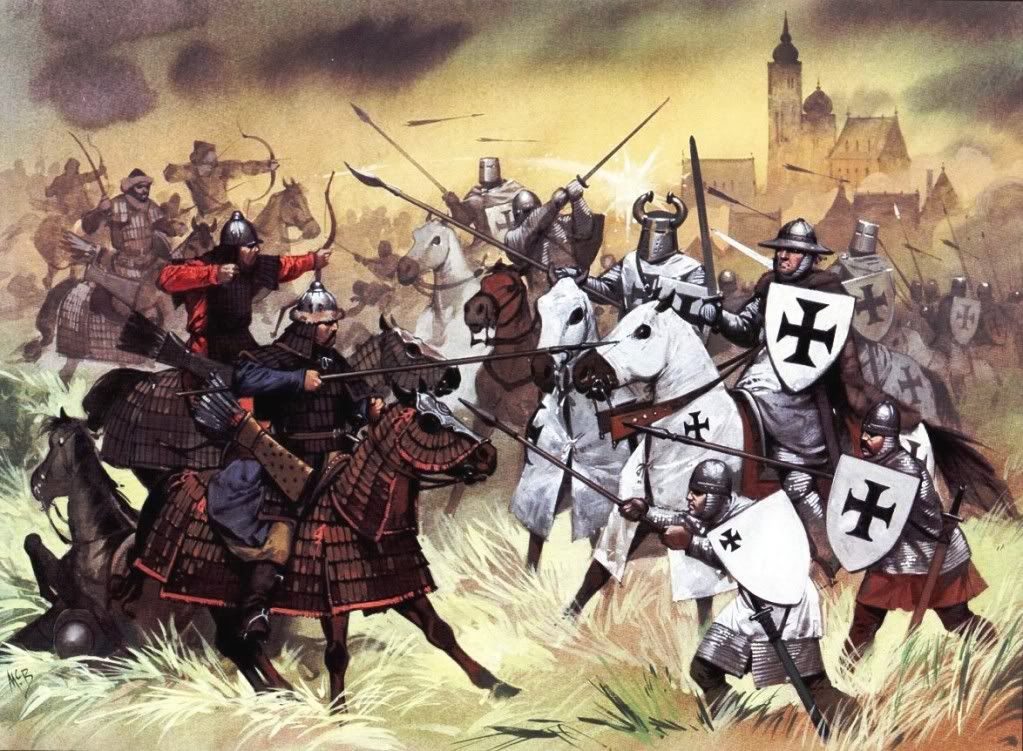
Teutonic Knights skirmishing with the rebellions Crimeans shortly after their annexation
The Great Crusade
The Great Crusade began June 16th, 1484 when the King of Castile declared war upon the Ottomans and their puppet state of Granada. It was a backlash against the Ottoman conquest of Rome and their subsequent subjugation, colonization, and forced conversion of the eternal city under the crescent of Islam. Unlike previous crusades, the Great Crusade was an un-coordinated effort over the course of three decades, driven primarily by the Teutonic Order and the Kings of Castile. With the numerous wars occurring in Europe neither nation could afford a complete commitment to the Crusade, which significantly prolonged its duration. A beneficial side effect was that it gave the crusaders time to consolidate their gains and plan future advances before proceeding, leading to far more stable gains than previous attempts.
Venice and Georgia quickly joined the Crusade with Castile, but even their combined efforts quickly stalled. Castile was easily victorious in Iberia and their rebuild fleet of Caravels utterly destroyed the Ottoman galleys, but they proved unable to defeat the Turkish armies. Rather than strike at Rome, the Crusaders went for the heart of the Ottomans at Edirne. However, the Castilian and Venetian armies could not land in sufficient numbers to overcome the Sultan's home guard. In the East the Georgians fought a fierce battle with the Turkish defenders, who were cut off from the main Ottoman armies in Europe by the Castilian blockade. By 1486 the Crusades had become a clear stalemate with neither side able to achieve ultimate victory.
Back in the Order, the limitations of Cherson as a staging ground were becoming increasingly apparent. Its port facilities were undeveloped, and it offered only a single line of assault. The supply lines through Poland were secure, but Karl Joseph was concerned that a massive Teutonic assault could bog down at a choke point along the Black Sea. With the Ottomans distracted by the Castilians, Karl Joseph made a risky move against the impotent "Byzantine Empire" which was an Islamic state in Crimea and Constantinople aligned with the Ottomans. The Ottomans ignored the plight of the Byzantines, perhaps because they wanted a Christian king in Constantinople as a pretext for a future invasion. Within a year Constantinople, Crimea, and Kaffa were in Teutonic hands.
Karl Joseph again showed his cautious nature by refusing an immediate invasion of the Ottomans, claiming that the war-ravaged Crimea and Constantinople needed to be fully pacified and rebuild before a massive Teutonic invasion. The European wars of 1486 - 1489 also prevented him from using the Order's full might against the Ottomans. While later events show that an immediate Teutonic crusade would likely have been a success, we must recall that at that time the Ottomans had a peerless reputation for military victories and had already driven back the Castilian crusading armies. It was prudent for Karl Joseph to wait for a more opportune moment to join the Crusade.
Rivers of Blood
Concurrent with the Crusade against the Byzantines in the summer of 1486, Karl Joseph decided to enforce his claims on the state of Ulm to further expand the Ordenstadt. This time however he had seriously misjudged the willingness and ability of the Austrian Emperor to resist his armies. Several years had passed since the Austrian-French wars, and the Austrians had developed new formations and tactics based on their experiences against the French. Meanwhile the Order had not engaged in a major war for almost two decades, leaving their troops and generals inexperienced compared to the battle-hardened Austrians.
The Order and its vassals were opposed by Austria, Bavaria, Ulm, and the Palatinate. While numerically superior, events would soon show that the Austrians would not go down easily. The initial Teutonic thrust of 12,000 men into Ersekujvar met with disaster. The Austrian general Alfred Casper completely outmaneuvered the Teutonic army and quickly destroyed half of it with an estimated 12:1 kill ratio. Only a swift retreat into Sandomierz saved the army from total annihilation. There they were joined by ~2000 Moldavian reinforcements, but were still no match for Casper as he struck again with great effect. The army retreated once more to Sierdaz, but the relentless Austrians pursued and inflicted another crushing defeat. In the final tally, it is believed that nearly 12,000 of the Order’s finest died for the loss of less than 4,000 Austrians.
To the west, a combined Austrian-Ulmian army of some 24,000 men had attacked a Teutonic army of 12,000 at Franken which retreated with heavy casualties. A second Teutonic thrust through Pressburg was repulsed by a far smaller Austrian Army. The general Friedrich von Richetenburg ordered the retreat believing that the Austrians were more numerous than they actually were. Not all the news was bad; when the Order fought non-Austrian armies they performed incredibly well. Over 10,000 men of the Palatinate were slaughtered in Trier for the loss of only 500, and a victory was won in Mainz against the army of Württemberg. But, with Sierdaz and Erz besieged by two brilliant and victorious Austrian generals, Karl Joseph was quite unhappy. Disaster struck again when the Emperor Rudolph V took to the field, and inflicted a crushing defeat on Friedrich von Richtenburg at Moravia. An estimated 6,000 men were lost to a mere 2,500 Austrians.
The Order had to alter its plans after these crushing defeats. Instead of facing the Austrians head-on, the remaining Teutonic armies would invade Austria and attempt to cut their supply lines. Simultaneously, the defeated armies would retreat to Prussia and regroup with the armies that had attacked Austria’s allies in Western Germany. Karl hoped to concentrate enough men within a year to take out the Austrian armies. This strategy soon brought some successes, with victories in Linz, Pressburg, and Vienna against the small, ill-lead Austrian armies left behind.
Realizing the danger, Rudolf V led his own army and ordered Casper to return to Austria, but attrition had taken its toll. The young Teutonic general Clemens August von Ekesparre lead a brilliant campaign, crushing the Emperor’s army at Vienne, then annihilating Alfred Casper’s army at Graz, all with his army of 12,000 men that he had lead from the start of the war without reinforcements. It was now winter and much of Austria was besieged by Teutonic forces. Two of the three main Austrian armies were destroyed, while the third was stuck in Erz, surrounded by increasingly powerful Teutonic forces. By the spring of 1487, Clemens August lead the final assault on the Austrian army at Erz. Starving, short on supplies, and facing overwhelming odds, Austria’s final 10,000 soldiers were utterly destroyed.
Austria’s ability to resist was broken. Although no substantial restitution was demanded from the emperor, Ulm was annexed and the Palatinate vassalized. The war had a significant impact on the Teutonic military organization. A report by Clemens August to the hochmeister found that the disastrous Teutonic defeats stemmed from superior Austrian leadership, and the fact that the Austrian armies contained a far greater proportion of cavalry than their Teutonic counterparts. On his suggestions, Karl Joseph re-distributed the command structure such that the most competent Teutonic generals would face the greatest battles, while the less competent would be sidelined to less critical areas. Furthermore the Teutonic infantry formations were re-equipped with an emphasis on pikes and re-drilled in the style of the Swiss guards. With the emperor following suit, this lead to the creation of the now famous landsknechten regiments which dominated the German battlefields for the next fifty years.
Karl Joseph blundered again in 1488 during the Teutonic conquest of Bamberg, Wurzburg. Believing that the Emperor would be too busy recovering from his recent defeat, Karl Joseph declared war on Wurzburg to enforce Teutonic claims, but the Emperor and his new English allies rose again to the challenge. For the first time, the Teutonic navy was challenged by an opponent of equal size.
Incredibly, the Austrians had succeeded in raising an army of over 30,000 men in the short time since the previous war. However, it was still far less than the Teutonic forces arrayed against them. Unexpectedly, the Austrian armies, lead by the famous general Alfred Casper struck east into Poland, swiftly knocking out the entire Polish army. It is thought that the Austrians believed that the English landings in Denmark and supposed English naval superiority would force the Order to split its armies between the North and South giving them a fighting chance. By knocking out the Teutonic allies early, they hoped to be able to attack the Order itself without having Austria swarmed by the smaller Polish armies.
The Teutonic navy was indeed unprepared for a major naval engagement, but instead of rashly setting sail to possible defeat, Karl Joseph ordered them to wait in port at Konigsberg until fully provisioned. Karl Joseph did not want to risk his naval forces which were essential for his plans in the Mediterranean. Unfortunately, this allowed the English to land approximately 30,000 men in Denmark, diverting troops from the Austrian front. Command over Austria was given to Clemens August, who had approximately 45,000 troops in theatre. In the North Karl Joseph took command with an army of ~16,000 and the Teutonic navy of ~35 capital ships. Opposing them were the Austrians and English with small combined numerical superiority, and the English navy which was yet untested.
By January of 1489, Clemens August had implemented a daring winter campaign against the entrenched Austrians besieging Moravia. Several cohorts were sent into Austria and Wurzburg to defeat their small defending armies and besiege their cities. Meanwhile he gathered 20,000 infantry and 10,000 cavalry into a grand army to attack Casper in a massive battle. This time the Austrians underestimated their opponents. Casper’s army was extremely cavalry heavy, with about 20,000 horsemen, ideal for the open plains of Moravia. Thinking that Clemens August had made a blunder, he opted for the flanking attacks with his cavalry which had worked so well against the Order in the past. However, the open terrain allowed the Teutonic pikemen to assemble their formations long before the Austrian charge struck, with deadly results to the Austrian cavalry. Although over a third of the Order’s infantry was killed by the Austrian charge the survivors held fast and most of the Austrian cavalry was killed by the unyielding Teutonic pikemen. Clemens August personally led a counter-charge with the Teutonic horsemen, and suddenly Casper was outflanked and outnumbered. The end result was total victory, but at a price. The entire Austrian army was annihilated, but at the cost of over 13,000 of Clemens’ army. The Battle of Moravia would go down in history as one of the greatest battles of its era.
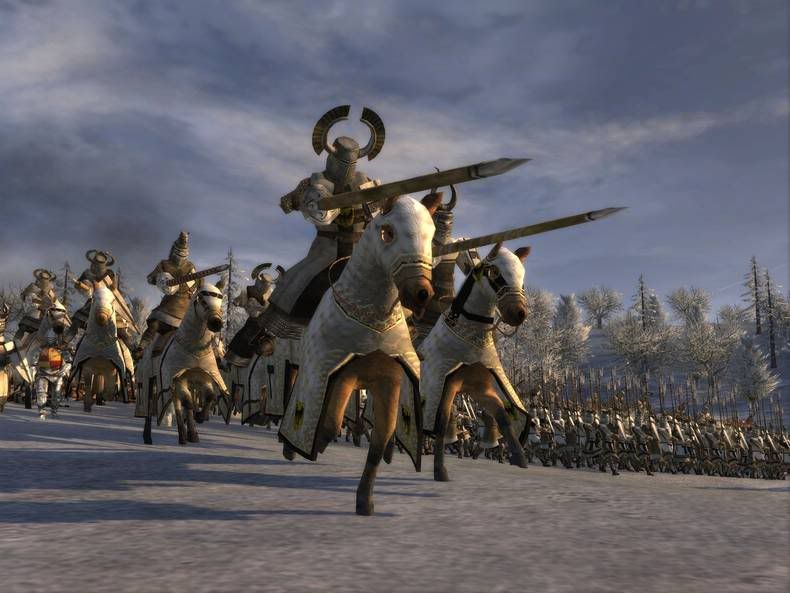
Clemens August von Ekesparre leads the counter charge against the Austrians at Moravia
The Teutonic Northern campaigns soon bore even better results. By the spring of 1489 the navy was sufficiently provisioned to venture forth, and with their assistance Friedrich von Richtenberg quickly annihilated 20,000 Englishmen in Slesvig and Holstein. Finally, the English and Teutonic fleets met in a pitched battle at the Oresund which was decisively won by the Order. Although the English fleet retreated without losing more than a few ships, their remaining ships were badly battered and in need of several months of repairs. Karl Joseph ordered a blockade of London, which severely hindered English trade.
By the summer of 1489, the Order had clearly won the war. The Austrian and English armies and navies were utterly defeated, England was under a blockade, and Austria was being occupied. At the peace table Bamberg was annexed and Austria forced to sever their treaties with England. For the English, Karl Joseph had a more humiliating plan. Since the 1860’s the nation of Brandenburg was under a personal union with England, leaving a large hole in the center of the Ordenstadt. In return for this interference in German affairs, Karl Joseph forced the English king to release the nation of Whales as a Teutonic satellite. If the English would work to prevent the union of Germany, Karl would prevent the union of the British Isles. In the end, despite the thinning of the Order’s manpower, the war was a huge success. All doubts about the ability of the Order’s armies to triumph over the Austrians were erased by Clemens’ victory at Moravia, and Teutonic navy had finally demonstrated its ability to defeat a major enemy at sea.
Gameplay Notes:
- The game was rather boring up to this point, with me lying low trying to burn the massive infamy from annexing Bohemia. Even though I had a mission giving me a core on Bohemia, the rest of their provinces were still full price
- The Austrians were a very nasty shock. They had 2-3 5/6 shock generals who slaughtered my men. After almost 20 years without a good fight my military tradition was low and my generals were crappy. Fortunately I got Clemens August who had a great shock rating, and the wars soon boosted my military tradition back up.
- Brandenburg was in a PU under England since the 1450’s, which made it impossible for me to annex or vassalize them despite several missions
 . Once they got out of it, I had cancelled them. I really wish there was a way to break PU’s
. Once they got out of it, I had cancelled them. I really wish there was a way to break PU’s
- I got land tech 13 and chose landsknecht. I hoped to lure in the Austrians to fight on unfavorable terrain, but the AI was frustratingly competent. In the end, I made a massive army lead by my best general, and smashed them. :happy:
- England could have been invaded, but I saw no point. They had nothing I wanted, and I wanted to preserve my manpower for the Ottomans.
Deus Vult!
May, 1491. The time had finally come. After years of painstaking preparation, Karl Joseph deemed the time ripe for a crusade against the Ottomans. This war would be the largest eastern crusade in almost four hundred years with 60,000 men participating. The entire Teutonic army was devoted to this venture, with only a skeleton force left in the Ordenstadt. 24,000 men were stationed in Constantinople, under the direct command of Karl Joseph himself. Two more armies of 12,000 men each were marching south through Cherson, under the command of Leopold Wilhelm von Tieffen and Nicolas de Chevigny. In Italy, Clemens August was given the honor of liberating Rome, with 12,000 men under his banner. In the Black Sea, half the Teutonic navy patrolled the Ottoman coast ready to cut off any naval movement. Karl Joseph’s fanatical attention to logistics had paid off, for the Teutonic armies had reached the Sultan’s lands in good order and with little losses to attrition.
As mentioned earlier, the Castilian Georgian, and Venitian crusades of the 1480’s had quickly devolved into stalemates. As of 1491 the Georgians had been annexed by Candar and the Venetians had given up, but the Castilians were still fighting. The main obstacle to their success was the massive Ottoman army which had annihilated all attempts to invade the sultan’s lands. The Ottoman navy had been all but destroyed however, and a total blockade of their coasts was causing massive internal strife. Karl Joseph hoped that the Teutonic push would be all it took to permanently crumble the Ottoman edifice.
The crusade was practically finished before it began. Immediately following the declaration of war, the main Ottoman army of 35,000 met Karl Joseph’s army at Burgas. Like the Austrians, the Ottomans army was extremely cavalry heavy with almost 25,000 horsemen. In a fierce battle, the outnumbered crusaders inflicted a crippling defeat, slaying 20,000 Turks for the loss of only 9,000 of their number. Although the remaining Ottomans managed to retreat in good order to Bulgaria, they were caught between the Teutonic armies from Constantinople and the newly arrived armies from Poland, and were quickly annihilated. Only a few scattered regiments of Turks survived the destruction of their main army, and were quickly hunted down by the 35,000 crusaders Karl Joseph had in theater. Victory in Italy also proceeded swiftly. Aided by rebellious Catholic patriots Clemens Augusts’ army quickly eradicated any Turks under arms, and in a triumphal procession handed control of the city back to the Pope. Victory over the Turks was only a matter of time.
1492 would go down in history as the year the Ottomans capitulated to the Christian powers. The Teutonic victories in Thrace and Bulgaria had opened the doors, and within a year the Sultan’s entire domain was occupied. The peace terms were harsh. All of Ottoman Italy was returned to local government and Rome to the pope. The Ottoman vassals and conquered states in Greece and the Balkans were given their independence. Bithynia, later renamed Nicaea was ceded to the Teutonic Order giving the Order a chokehold on the Black Sea, and Athens was given to Castile. Once victory was certain, dozens of minor European nations such as Venice, Genoa, Naples, Norway, Sweden, and even Muslim Candar joined in the crusade eager for a piece of the Ottoman pie. Worse yet, the unending war and total destruction of the Ottoman army lead to massive debt and unrest, which would eventually culminate in the total collapse of the Ottoman empire. The great Islamic menace to the Western world was utterly vanquished.
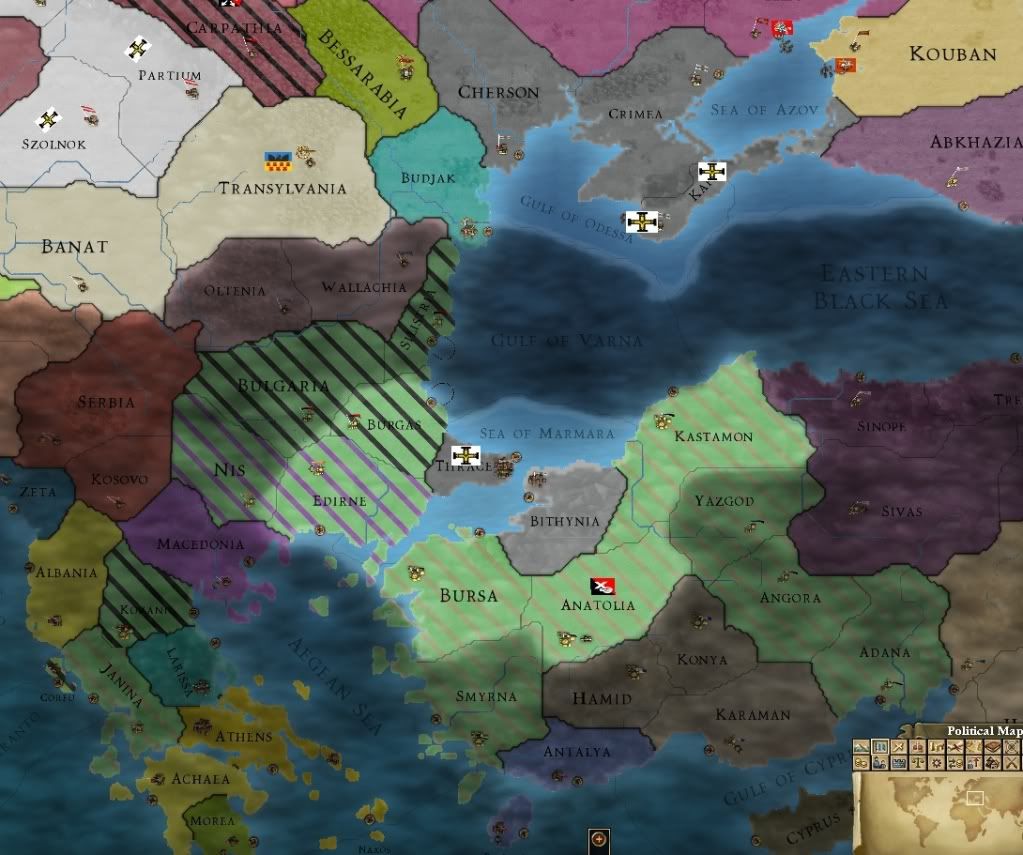
The Ottoman Empire after the end of the first Teutonic crusade
Sadly, Karl Joseph did not live long enough to enjoy the fruits of his triumph. Ironically, despite his largely successful efforts to prevent attrition amongst the crusaders, he himself fell ill to heatstroke and dysentery on the campaign and retired to Constantinople in late 1492. Despite a brief recovery, he fell ill again and died in January 1493. In accordance with his will, his mausoleum was located in Constantinople and is now a popular shrine for Catholic pilgrims. In appreciation for his liberation of Rome, he was posthumously canonized as a saint in 1525.
Aftershocks
The Ottomans’ defeat is regarded as a critical moment in history, marking the beginning of the decline of Islam and the renewed ascendancy of the West. Its effects on the Ordenstadt itself were no less profound. The victorious crusading spirit in the returning armies infected the local populace with a spirit of religious zeal and renewed devotion to the Catholic Church, a nationalistic and religious fever that bound the German populations even closer to the Teutonic Order and thus the Papacy. This was further reinforced when the grateful pope declared the Teutonic Order "Clipeum de Christianae" (shield of Christendom) charging them with the defense of Europe against the Easter hordes and the subjugation of Islam. The German people began to gain a national sense that it was their divinely ordained destiny to enforce the One True Faith, or “Unum Sanctum.”
On the field of international diplomacy, the stunning Teutonic victory gave the Order substantial prestige and legitimacy when dealing with the Holy Roman Emperor. In recent years many felt that the Order was more concerned with temporal power than with advancing Christendom. Their victory reinforced the Order’s argument that to successfully defeat the heathens a strong, unified state was needed. Furthermore, what use was an Emperor who was unable and unwilling to defend or reclaim Christian lands from the Muslims? How could anyone take a Holy “Roman” Emperor who lost Rome seriously? In effect, the Teutonic Order was beginning to supplant the Emperor in responsibility and authority.
Gameplay Notes:
- I had the mission “recover Rome” which automatically gave Rome to the Papal States after I obtained it. I should note that central Italy is now Muslim.
- The Ottomans’ disintegration was epic to behold. Immediately after I killed their army virtually everyone else DOWed them and their stability plummeted to -3. The biggest challenge was grabbing enough land before everyone else to force a good peace.
- I got a new NI and chose Unum Sanctum… getting ready for the reformation

- Manpower ebbed rather low at this point. Fighting the Austrians then the Ottomans was slightly taxing
Author’s Notes: I’m happy to announce that the next update will contain actual in-game pictures!!! My oldest savegame is from 1502, so the 1500 status update will contain actual stats! We’re about 50 years away from where I began taking screenshots, so hopefully the quality and accessibility of the AAR will improve dramatically in the next few updates!



